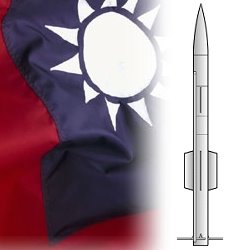Diplomacy, it seems, is as much damage control as it is the substantial fashioning of relationships between states. The principal tool of diplomats — especially when it comes to damage control — is, obviously, rhetoric. By paying close attention to what is being said, it is easy to determine whether a state has a well-rounded, coherent strategy or is just struggling to maintain the appearance of having a handle on things. As we saw last week with US Vice-President Dick Cheney’s threats to Pakistani President Pervez Musharraf on the issue of fighting the Taliban, contradiction are usually indicative of policymaking confusion.
 This week, Washington once more proved that its policies on the Taiwan Strait issue is no more coherent. The first instance is actually a long continuation of a trend, which consists of (a) a paranoid view of Chinese military growth (the People’s Republic of China’s military budget increased 17.8 percent this year) and the incessant references to the “threat” that this poses to neighboring states and US interests in the region; and (b) of Washington’s recriminatory attitude whenever Taiwanese President Chen Shui-bian (陳水扁) makes any kind of reference to independence, which Washington never fails to slap down as a “threat to peace and security in the Taiwan Strait” and as threatening to US support for the democratic nation. Here again, the contradiction is a lurid one: non-democratic, expansionist China is a growing threat, democratic Taiwan is an ally worthy of protection, but any attempt at normalization of status or reference to independence in face of Beijing’s avowed threats of military aggression is portrayed as treason.
This week, Washington once more proved that its policies on the Taiwan Strait issue is no more coherent. The first instance is actually a long continuation of a trend, which consists of (a) a paranoid view of Chinese military growth (the People’s Republic of China’s military budget increased 17.8 percent this year) and the incessant references to the “threat” that this poses to neighboring states and US interests in the region; and (b) of Washington’s recriminatory attitude whenever Taiwanese President Chen Shui-bian (陳水扁) makes any kind of reference to independence, which Washington never fails to slap down as a “threat to peace and security in the Taiwan Strait” and as threatening to US support for the democratic nation. Here again, the contradiction is a lurid one: non-democratic, expansionist China is a growing threat, democratic Taiwan is an ally worthy of protection, but any attempt at normalization of status or reference to independence in face of Beijing’s avowed threats of military aggression is portrayed as treason.The reason why Washington’s rhetoric is so contradictory is that its policy on Taiwan is actually a non-policy — the maintenance, in lieu of progress, of the status quo whereby China will not invade Taiwan and the latter will not declare unilateral independence. It would be all nice well if the international system were static and the balance of power unchanging, but that is not the case. Beijing is building up and modernizing its military, and there are growing indications that Beijing may not always have full control of its military apparatus, which one day could result in enterprising individuals making military decisions that do not entirely correspond to or reflect the wishes of the civilian leadership. While the panicking, to the point of irrationality, segments of the US intelligentsia and policymaking circles overestimate the Chinese “threat” and misrepresent its aims and intentions, it remains that Beijing’s policy on Taiwan does include the use of force — and the odd 1,000 missiles it points at Taiwan as well as the language adopted in its “Anti-Secession” Act attest to that. With these two contradictory forces shaping Washington’s views, its language becomes one of obfuscation, one that simply cannot lead to political development.
Taiwan is therefore a friend, in extremis one worthy of protection, but it cannot be allowed to act in its own interest or to seek for its 23 million people the representation on the world stage that they deserve. Beijing, for its part, is at times friend, at times enemy, a partner in trade but a brewing storm over the horizon. The signals are mixed, and diplomats’ rhetoric reflects that.
Aside from contradictory language, empty, meaningless rhetoric is also part of the diplomat’s toolbox. Something needs to be said to fill a void, but once it is analyzed it is obvious that whatever was said makes no contribution whatsoever. The Taiwan Strait conflict offers many examples of this, such as when US Deputy Secretary of State John Negroponte, visiting China over the weekend, said that the 450 air-ground missiles the US intends to sell Taiwan to equip its F16s “would be for strictly defensive purposes and consistent with our ‘one China’ policy.” Close scrutiny of the language cannot but beg the question: what other use but a defensive one would Taiwan make of these missiles — invade China, perhaps? Everybody and their dog knows that the only reason why Taipei would seek such weapons, along with other packages, is to defend itself from an eventual military attack by China (whether a successful defense, under the present conditions, can be achieved is beyond the scope of this entry).
One would think that clear, rational policies lie behind and inform the relations between states — more so when it comes to unstable issues like Taiwan and China. The reality, however, is otherwise. Look to the language, see what is being said. More often than one would think, the rhetoric is empty and the diplomat is no more than the messenger attempting to buy time.

No comments:
Post a Comment